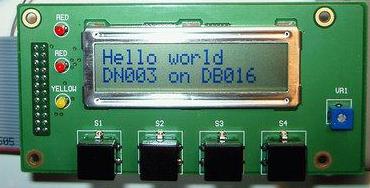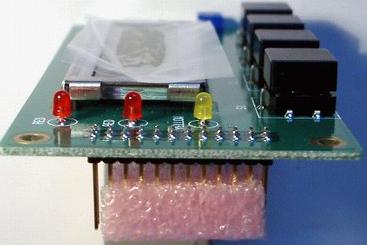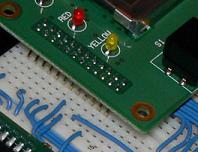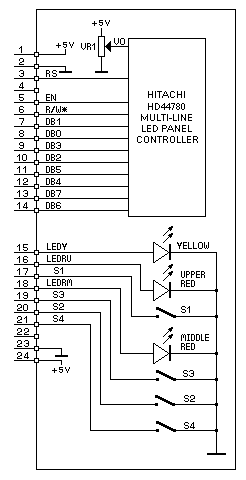



 Standard Hitachi
HD44780 controller, (actual Hitachi,
not a clone) Compatible with most LCD
microcontroller code.
Standard Hitachi
HD44780 controller, (actual Hitachi,
not a clone) Compatible with most LCD
microcontroller code.
416028
Pete says: "Your 2x16 LCD panel is hot! Any chance you have a 4x24 unit in the works?" James Newton answers Sorry, no. These are one of a kind, overstock items that will no longer be available when the existing stock runs out. I can't begin to make such an item for this price.
juanmarod says: "Thank you. Very good Displays. Every think ok. I put you a positive feedbak on Ebay."
John Muchow says: "James, I just received my order of three LCD Front Panels, thanks for the great service! I'm looking forward to getting my PICs hooked up to them. :-)"

Bud Justen points out that an old IDE or other 2x12 or better cable will plug right into the header and provided some nice instructions and code for using it with the popular Arduino. Richard Cooke provided a sample project with the PICAXE BASIC system and an ADC test circuit.
Measurements in millimeters and inches.
| Pin | Label | Description | Ratings |
| 1 | Udd | Supply voltage: | 5V+-0.25 Max:-0.3-6.5 |
| 2 | Uss | GND | |
| 3 | RS | Register Select: | 0-5V Max:-0.3-Udd+0.3 |
| 4 | NC | No connection | |
| 5 | E | Read /write enable | 0-5V Max: -0.3-Udd+0.3 |
| 6 | R/W | Read /write select | |
| 7 | DB1 | Data bits | |
| 8 | DB0 | ||
| 9 | DB3 | ||
| 10 | DB2 | ||
| 11 | DB5 | ||
| 12 | DB4 | ||
| 13 | DB7 | ||
| 14 | DB6 | ||
| 15 | CLED | LED C (+) | Max:3V 25mA |
| 16 | ALED | LED A (+) | Max:3V 25mA |
| 17 | S1 | Switch 1 | Max:24Vdc 50mA |
| 18 | BLED | LED B (+) | Max:3V 25mA |
| 19 | S3 | Switch 3 | Max:24Vdc 50mA |
| 20 | S2 | Switch 2 | Max:24Vdc 50mA |
| 21 | S4 | Switch 4 | Max:24Vdc 50mA |
| 22 | NC | No connection | |
| 23 | Uss | GND | |
| 24 | Udd | Supply voltage |

Arnbient Temperature Range: 32...122'F (0...50'C)
Storage Temperature Range: -13...158'F (-25...70'C)
Questions:
Who is the manufacturer for *this* particular display and what is it's part number ??? I haven't been able to locate it elsewhere after many hours of web searching.
James Newton of Massmind replies: No one knows. The units were purchased from a company that was going out of business and no records of who they purchased the units from has survived.
Ben Voigt replies: Sad that all the information I can find seems to be for the newer -U version of the chip, which does support 3.3V inputs (even when supply is 5V), as all signals above 2.2V are considered "high". Might that work with the chip used on these boards as well? [Of course the microcontroller needs 5V-tolerant I/ (mine does) or the return data will blow it up, I guess this can be prevented with either series resistors or by keeping the R/W line set correctly.]
Hey, I am way new to this whole LCD Panel + microcontroller stuff, can you give me a few links to places where I can learn to write and load software onto this thing? I really love this product and it's exactly what I need!
James Newton replies: See: /techref/io/lcd/44780.htm
Comments:
This LCD module is a custom Phico model which has long been out of production. It uses the original Hitachi HD4470 5V-only IC which has several minor design bugs, none of which are of much concern. It works fine in both 8-bit and 4-bit parallel data bus mode. Even with the newer HD44780U IC, don't expect to be able to read CGRAM and DDRAM. Hitachi blatantly neglected to provide proper documentation for RAM read timing even though they claim this can be done. However, there is really no need to read RAM, since the programmer is supposed to know what he wrote to RAM in the first place. Creating custom characters works fine, but Hitachi gives an incomplete character code chart, much like their HD44780(U) data sheet.
I have also have a complete AVR program that writes to the LCD and LEDs. I haven't tested the switch inputs yet, but that seems like a no-brainer. If anyone is interested in getting any of this corrected info then just let me know. You can find that code here: Atmel AVR, LCD Display driver, PHICO Panel, HD44780, Ray Pasco
Interested: